Research, editing : Gan Yung Chyan, KUCINTA SETIA
News on CCP, U.S., Taiwan, disease control
News (1)
Xi Jinping's 20th National Congress does not rule out military unification of Taiwan, arousing attention
Reporter : Zhnag Ting / Editor: Lin Yan / https://www.epochtimes.com/gb/22/10/16/n13846780.htm / Image : Taken on 4 February 2021, with the city of Xiamen, China as the background, the islands under the jurisdiction of Taiwan are located in the sea off Lieyu in the Taiwan Strait and the outlying islands of Kinmen. It is the closest part of Taiwan to China, and this part of Taiwan's territory is one of the largest deep-water ports in China. Xiamen is less than 3 miles away. (An Rong Xu/Getty Images)
On Sunday (16 October 2022), during his speech at the opening ceremony of the 20th National Congress of the Communist Party of China, although General Secretary Xi Jinping, did not explicitly name the United States,he was secretly criticizing the United States. On the Taiwan issue, Xi Jinping once again emphasized that the use of force is not ruled out, and he also rejected the interference of "external forces", and declared that he would strengthen the modernization of the military, which aroused the attention of public opinion.
"In the face of serious provocations from the separatist activities of the 'Taiwan independence' forces and the interference of external forces in Taiwan affairs, we resolutely carry out major struggles against separatism and interference," Xi said.
Xi Jinping made it clear that Beijing "will never promise to give up the use of force, and reserves the option of taking all necessary measures, which is aimed at the interference of external forces and the very few 'Taiwan independence' separatists and their separatist activities."
Taiwan's presidential office has responded to Xi's speech on Sunday by saying that Taiwan will not back down on issues of sovereignty or compromise on issues of freedom and democracy, and that the people of Taiwan clearly oppose Beijing's concept of "one country, two systems" governing Taiwan.
"Taiwan's mainstream public opinion has also made it clear that we firmly oppose 'one country, two systems'." Taiwan's presidential office said, "Taiwan's position is very firm."
As military tensions between China and the United States escalate over the Taiwan issue, Xi Jinping also emphasized in his speech the need to speed up military development and build a world-class military. He threatened to "create a new situation in the modernization of national defense and the military", "comprehensively strengthen military training and preparations for war...build a strong strategic deterrent force system, increase the proportion of new combat forces in new areas, and further promote actual combat military training."
The Financial Times reported that Chang Wu-yueh, a professor at Taiwan's Tamkang University (Tamkang University), said, "As the US and China become involved in great power competition, Beijing is now increasingly focused on boycotting its perceived external 'intervention' in the Taiwan issue."
According to CNN, Wen-ti Sung, a political scientist who teaches at the Australian National University's Taiwan Studies Program, said Xi's decision to raise the Taiwan issue early in his speech, unlike previous speeches, conveyed progress on the Taiwan issue. a new sense of urgency.
Although the CCP has never ruled Taiwan, it claims sovereignty over Taiwan.
The New York Times reported that Chen Jianfu, a professor at the Institute of China Studies at Tamkang University, said that the international community has turned the Taiwan issue into an international affair, and China (the CCP) has been reluctant to admit it in the past. "It has always been felt that the Taiwan Strait issue is China's (CCP's) internal affairs and internal issues, but now it has become an entire international issue."
Some analysts interpreted the Taiwan portion of Xi’s speech as a gradual follow-up to a white paper issued by the CCP government after U.S. House Speaker Nancy Pelosi’s visit to Taiwan in August. Pelosi's visit to Taiwan aroused strong dissatisfaction within the CCP, and the CCP subsequently launched live-fire military exercises in six water areas around Taiwan.
Xi Jinping suggested that all options could be directed against Taiwan.
"This lack of substantive commitment to specific policy approaches or tools shows that China is still implementing what Xi also used in his speech - 'strategic patience'," Song said.
Alexander Huang, a senior official with Taiwan's Nationalist Party, said Xi did not use the term "one country, two systems" when referring to Taiwan in the written text of the work report, but not in his speech.
"This shows that China (CCP) wants to have more dominance, more initiative in its own hands," Huang added.
These attempts are well documented. Over the past three years, Beijing has rolled out a series of initiatives similar to those planned after the issue of Taiwan's unification, signaling to the public that the era is coming.
These include a rail link between the coastal cities of Fuzhou and Taipei, which is planned for the National Transportation Network Project to be completed by 2035. Others include posted advice on social media to Chinese citizens about buying a house in Taiwan after reunification.
News (2) to (7) / Reporter : He Yating / Editor: Hu Long / https://www.ntdtv.com/gb/2022/10/16/a103553021.html
News (2)
What do experts and scholars from around the world think of Xi Jinping's report to the 20th National Congress of the Communist Party of China?
Image : CCP President Xi Jinping reads a political report at the opening ceremony of the 20th National Congress of the Communist Party of China in Beijing's Great Hall on 16 October 2022. (Kevin Frayer/Getty Images)
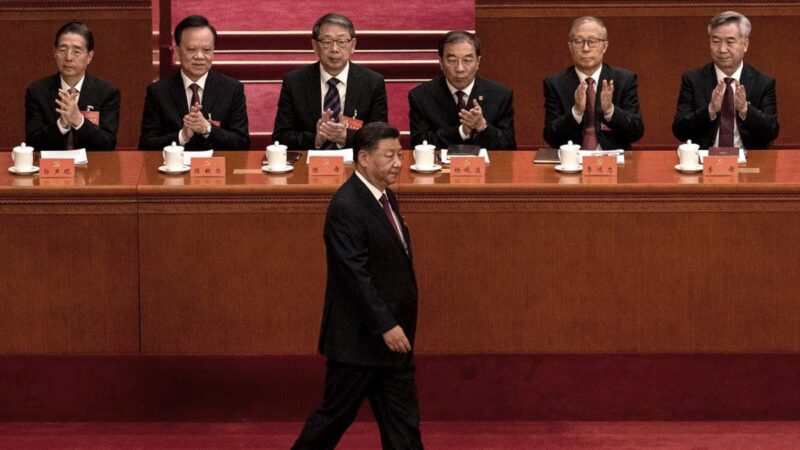
The 20th National Congress of the Communist Party of China was held in Beijing on 16 October 2022 as scheduled. As the general secretary of the Communist Party of China, Xi Jinping, the general secretary of the Communist Party of China, spent about two hours reading a political report at the conference. Mainstream media, experts and scholars from all over the world have analyzed and interpreted Xi's report one after another.
Deutsche Welle Chinese website reported that in his political report on the first day of the 20th National Congress of the Communist Party of China, Xi Jinping emphasized the sense of urgency, as well as major tests, various difficulties and challenges. Recently, the CCP government has faced many challenges, both internally and externally. Internationally, there are sanctions against high-tech companies from the United States, doubts about the Belt and Road Initiative, and Western criticism of human rights in Xinjiang and Hong Kong; domestically, large-scale testing related to the "zero-covid" epidemic prevention policy and the lockdown of the cities, CCP China has fallen into an economic growth crisis.
News (3)
40 years of reform and opening up have ended following re-emphasis on dynamic clearing
"I think 40 years of reform and opening up have come to an end," said Chinese political scientist Wu Qiang.
Richard McGregor, a China expert at the Lowy Institute for International Policy, an Australian think tank, said that today's relationship between China and the United States has turned into a "confrontational" relationship, and Xi Jinping insists on "dynamic clearing". "Zero-covid and unwavering" has dashed hopes that anti-epidemic policies might be relaxed after the 20th National Congress of the Communist Party of China.
DPA pointed out in a related report that Xi Jinping's speech at the 20th National Congress represents the end of the CCP's reform and opening-up policy, and will be replaced by autocracy, party influence and ideology, and Xi Jinping is adopting these communist policies in old-fashioned ways to maintain power, but call it "Chinese-style modernization."
News (4)
Xi defends CCP's practices on the pretext of "Chinese" approach without consensus
According to a Reuters report, Scott Kennedy, a senior adviser at the Center for Strategic and International Studies (CSIS), noted that Xi Jinping repeatedly emphasized the importance of "Chinese characteristics" at the conference. He said: "Xi Jinping has rightly defended all the current domestic and international practices of the CCP... The most striking theme is that he emphasizes the development of unique 'Chinese' approach."
News (5)
Xi wants the world to follow CCP's style of development order, CCP no longer concentrates on economic development and reforms
Kennedy believes that this shows that "Xi wants the Chinese Communist Party, China and the international system to go in a very different direction than the direction the United States and the West laid out last time."
Chen Zhiwu, a professor of finance at the University of Hong Kong, observed that the conference de-emphasized economic development and economic reform, which he saw as a major shift. He said: "From the 14th National Congress to the 19th National Congress of the Communist Party of China, it has been clearly stated that economic development is the central task of the party, but this time it was not mentioned."
John Delury, a professor of Chinese studies at the Institute of International Studies at Yonsei University in Seoul, South Korea, believes that under the economic and social pressure caused by the zero-epidemic prevention policy, Xi Jinping's speech may sound like he is defending many Chinese people.
Bates Gill, professor in the Department of Security and Criminology at Macquarie University in Sydney, Australia, commented: "This is not meant to be a policy speech, but a celebration of past achievements and a full display of support for the party and the path it has chosen with confidence, and urging party members to push harder. (This speech) is a tribute to the party and, in essence, his leadership as he breaks with recent conventions and tries to stay in power indefinitely."
Wu Muluan, an associate professor at the Lee Kuan Yew School of Public Policy at the National University of Singapore, analyzed that Xi Jinping's main concern is "security". He seems to want to base the legitimacy of his regime on the so-called safeguarding of "national security" and base their legitimacy on their ability to provide economic growth.
News (6)
CCP worries about security, hence Xi prioritizes on security
Ja Ian Chong, associate professor of political science at the National University of Singapore, said bluntly: "I did notice the discussion of security, which is not surprising, because on several fronts, China (the CCP) is now more worried than five years ago. Much more before."
News (7) to (12) / Editor : Li Ming / https://www.ntdtv.com/gb/2022/10/16/a103553016.html
News (7)
U.S. media: CCP may replace Russia as the main supplier of low-end arms market
Image :The 9A83ME launcher unit of the Russian-made anti-ballistic missile system S-300VM (Antey-2500) was displayed at the International Aerospace Exhibition outside Moscow. (Kirill Kudryavtsev/AFP via Getty Images)
美媒:中共恐将取代俄国成为低端武器市场主要供应商
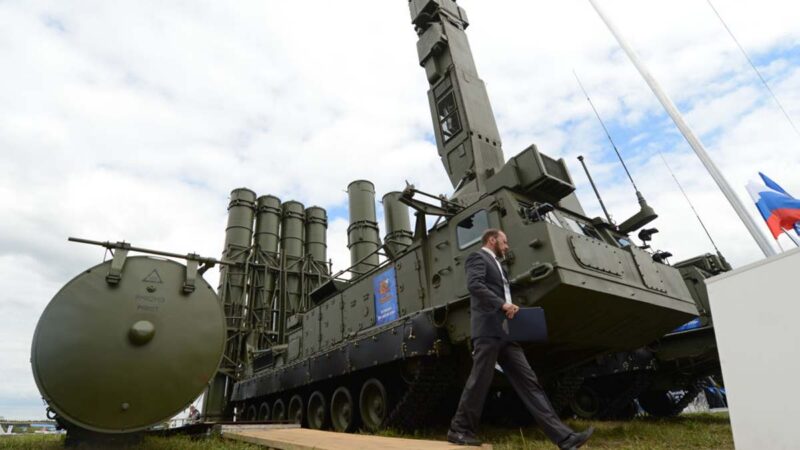
Russia's invasion of Ukraine accidentally exposed the shortcomings of the Russian military's old military equipment, which has shaken Russia's dominance in the global low-end weapons market. The American "Foreign Affairs" magazine pointed out that the CCP is planning to replace Russia's position in the low-end arms market, and to establish close relations with the ruling figures of other countries and expand its geopolitical influence, calling on the U.S. policy community and defense industry to consider countermeasures as soon as possible.
According to a compilation report by the Canada-US Financial Network on 14 October 2022, the bimonthly "Foreign Affairs" magazine published by the Council on Foreign Relations published an article discussing the dramatic changes the global low-end arms market is facing.
News (8)
Market for cheap arms dominated by Africa, Asia and Latin America
The article stated that in today's world, the United States dominates the global market for high-end, high-tech weapons, while Russia is the main supplier of lower-tech weapons. In 2022, the market for cheap arms will be dominated by African, Asian and Latin American countries, which will spend a combined $246 billion on defense. The Russian-made T-72 and T-80 tanks, 2S19 152mm and other self-propelled howitzers, BM-27 "Hurricane" 220mm self-propelled multiple rocket launchers, BM-30 "Tornado" 300mm self-propelled multiple rocket launchers, S-300 missile defense Systems, as well as cheap weapons such as the BMP-3 infantry fighting vehicle and the BTR-70 wheeled armoured vehicle, are not only keen to purchase by low-income countries, including some middle-income countries such as Brazil, India and Thailand that have access to the high-end weapons market, but also purchase in bulk.
News (9)
CCP is poised to fill the void of Russia as supplier of cheap arms, dominate military presence outside China
However, since the Russian military invaded Ukraine in February, the fact that Russian military equipment needs to be updated, U.S.-led sanctions against Russia, and buyers’ concerns about how Russian equipment will perform on the battlefield have all reduced Russia’s ability to export weapons. With U.S. defense companies generally not competing in the cheap arms market, Russia’s current difficulties have created a market vacuum that CCP is poised to fill.
“If left unchecked, Beijing could use defense equipment sales to forge closer ties with other countries’ ruling elites and ensure China’s military presence outside China,” the article said, adding that the expansion of China’s foreign arms sales would limit the global presence of the U.S. military mobility, and thereby undermining U.S. influence in the current geostrategic competition.
News (10)
Six reasons why CCP may replace Russia to dominate the global low-end arms market
This article analyzes several main reasons why China may replace Russia to dominate the global low-end arms market:
First, China's arms exports are completely transactional and are not affected by human rights issues or regime stability issues. The CCP sells weapons not only for economic returns, but also for the ports and natural resources of the countries receiving the weapons.
Second, China's experience as a licensed producer of certain types of Russian military equipment increases its customer appeal in the cheap arms market. For example, after the Chinese government and Russia signed a strategic partnership agreement in 1996, China was authorized to produce Russia's Su-27SK Flanker fighter.
Third, the CCP has copied Russia’s strategy to produce cheap substitutes for Western high-tech armaments and has diversified its weapons products. In addition to selling cheap weapons, China has recently started selling higher-end weapon systems, such as anti-aircraft missiles and JF-17 fighter jets, to key customers.
Fourth, CCP China is now the world’s largest exporter of drones. Egypt, Iraq, Jordan, and Saudi Arabia, which used to buy drones from the United Kingdom, France, Russia, and the United States, are now buying pterosaurs and rainbows from China— Type 4 drone.
Fifth, the CCP officially encourages Chinese companies to acquire foreign technology and then “re-innovate”, which reduces development costs and gives them a head start in the cheap weapons market.
Sixth, rare earths are vital to the manufacture of some of the most modern defense equipment, but mining and processing rare earth elements generates large amounts of toxic waste, and China’s lax environmental regulations have given it a dominant position in the global trade in rare earth metals, It can coerce other countries by restricting rare earth sales, including by restricting rare earth exports to the United States and hindering the production of high-end combat systems such as the F-35.
News (11)
CCP is expanding its geopolitical influence through arms sales and challenging the U.S. that should help allies develop weapons production capabilities
The article further pointed out that after China dominates the low-end arms market, it will use arms sales to expand its geopolitical influence, keep arms recipient governments away from the influence of the United States, and challenge the global mobility of the United States.
The article calls on the U.S. government to change its strategy. Even if U.S. companies do not directly compete in the cheap weapons market, they should help their allies to develop weapons production capabilities, so as to frustrate the CCP’s ambition to dominate the cheap weapons market.
News (12)
The U.S. should reform parts of ITAR to limit military technology export or remove ITAR restrictions
To that end, the U.S. government should reform parts of the International Traffic in Arms Regulations (ITAR) designed to limit the export of military technology. For example, formulate the relevant parameters in the sunset clause of the ITAR to facilitate the export of low-end weapons and allow its partners to start production; to facilitate partnerships between U.S. defense enterprises and foreign defense industries, the U.S. should also establish an application system, to remove ITAR restrictions on individual products.
The article recommends that the U.S. government take measures such as tax cuts and debt write-offs to incentivize U.S. companies and partner countries to jointly produce relatively inexpensive high-quality weapons. For example, it could work with South Korea and India to improve its T-50 "Golden Eagle" advanced trainer and Tejas fighter jets, South Korea's K9 "Thunder" howitzer and India's light tanks for the cheap arms market.
"U.S. participation in the cheap arms market will also strengthen its own supply chain by supporting partner industries, diversifying U.S. defense suppliers, and politically engaging with importers of the cheap arms market," the article reads. and industrial base.”
The final article points out that the above-mentioned reform proposals will promote the resilience of the U.S. defense industrial base, while encouraging allies to join the competition in the cheap weapons arms market can strengthen ties with allies, restrain the CCP’s military expansion, and gain a strategic advantage over the CCP.
News (13) to (19) / Reporter : Li Chen / Editor: Li Hong / https://www.ntdtv.com/gb/2022/10/17/a103553089.html
News (13)
On the occasion of the 20th National Congress of the Communist Party of China, the CCP kidnapped and harassed Falun Gong practitioners on a large scale
Image : Armed police guard Tiananmen Square before the opening of the 20th National Congress of the Communist Party of China on 16 October 2022. (Noel Celis/AFP via Getty Images)
二十大之际 中共大面积绑架骚扰法轮功
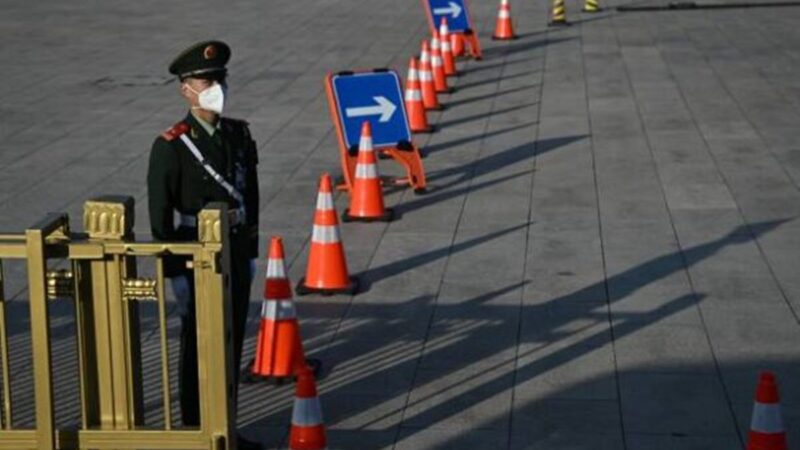
The 20th National Congress of the Communist Party of China will open on October 16. In the past few months, the CCP kidnapped and harassed Falun Gong practitioners nationwide on the pretext of maintaining stability at the 20th National Congress of the Communist Party of China.
Regarding this incident and the status quo of religious freedom in China, Sam Brownback, the former U.S. ambassador for religious freedom, said in a video interview with The Epoch Times on October 14 that the CCP has declared war on all religious beliefs and what it does to its own people. "is evil".
News (14)
11 people kidnapped and ransacked in Baoding, Hebei
Minghui.com reported that on 26 September, 11 Falun Gong practitioners in Jingxiu District of Baoding City were illegally raided and kidnapped at the same time, and their personal belongings such as printers, computers, recorders, and Falun Gong books were taken away.
The Hebei correspondent of Minghui.com stated that when these Falun Gong practitioners were kidnapped and taken to the police station, many forms had been prepared, indicating that the police had made full preparations in advance before they began to act in unison. It is estimated that the police connected these people through mobile phone monitoring.
News (15)
40 people harassed in Sanhe, Hebei
In September 2022, Hebei Sanhe Municipal and Legal Committee, public security, and national security put pressure on each police station. The police at the police station harassed at least 40 Falun Gong practitioners. Some of them harassed by phone calls, some knocked on the door, some secretly filmed, videotaped, and some deceived their family members to make a small video.
News (16)
More than 10 people in Chongqing Shapingba Shuangbei area kidnapped, ransacked and harassed
Chongqing Falun Gong practitioner Zeng Zhijun, female, 82 years old, was harassed on the afternoon of September 20. At 9:30 p.m., he was illegally raided by five or six police officers for 20 minutes. The police confiscated dozens of Falun Gong books and even the truth paintings on the walls. After Zeng Zhijun was kidnapped to the police station, he was released home at 11:30 in the middle of the night.
In the afternoon of 20 September 2022, Falun Gong practitioner Li Jilan was not at home, and her husband was at home. Five police officers broke into Li Jilan's house and confiscated nine Falun Gong books. At 8 o'clock that night, the police kidnapped Li to the Jingkou police station. In the early morning of 21 September, Li was released home.
Many people were kidnapped and ransacked in Changyi District, Jilin City, Jilin Province
On 27 September, several Falun Gong practitioners were kidnapped and their homes searched in Changyi District, Jilin City, Jilin Province.
A female Falun Gong practitioner surnamed Zhang in Building 11 of the Railway Residence and a female Falun Gong practitioner named "Xiao Li" who came to the house were kidnapped and their homes were searched. The police confiscated computers and many Falun Gong books.
Zhao Xudong, a 77-year-old male Falun Gong practitioner from the Mamian community, and his daughter Zhao Guokun, a Falun Gong practitioner who came to visit him, were kidnapped. The police ransacked homes and confiscated many Falun Gong books, computers and printers. Zhao Guokun went home at night after being illegally "released on bail pending trial".
Many people were kidnapped and robbed in Hecheng District, Huaihua City, Hunan Province
On 29 August 2022, Huaihua City Public Security Bureau, Hecheng District Public Security Bureau, and Huaitie Public Security Department jointly abducted and searched homes of Falun Gong practitioners in Hecheng District, Huaihua City. At least 18 Falun Gong practitioners were kidnapped and robbed.
Among them, Jiang Zhonghui and Zhong Liancong were illegally detained and are still being illegally detained in the Huaihua City Detention Center. It is reported that Zhong Liancong was illegally arrested in mid-September.
The persecuted Falun Gong practitioners this time also include Wu Fangming, Chen Quanying, Wang Minghong, practitioners surnamed Jian, Xue Baoyu, Xiao Guiying, Yin Qiuyang, Tang Qingying, Yang Xiaohui, Yang Guihong, Qiu Qianying, Liu Yu'e, practitioners surnamed Luo, practitioners Yi, and Li Wait.
In addition, Falun Gong practitioner Tang Qingying was released on bail pending trial, and Yang Xiaohui was placed under residential surveillance.
News (17)
Heilongjiang Daqing Public Security Bureau kidnapped and harassed hundreds of people, including more than 20 elderly people
On July 12, the police in various places in Daqing City, Heilongjiang Province kidnapped more than 100 Falun Gong practitioners according to the list without showing any legal procedures, and illegally searched their homes.
More than 20 Falun Gong practitioners over the age of 70 were also kidnapped and harassed by the police. Among them, more than a dozen are over 80 years old, and there is a 98-year-old surnamed Li.
News (18)
Over 1,800 persecuted in July and August 47 sentenced in September
Minghui.com learned that from July to August, at least 1,850 Falun Gong practitioners were kidnapped by the CCP police; 18 Falun Gong practitioners were persecuted to death. In September, 47 Falun Gong practitioners were sentenced by the CCP.
Falun Gong is a cultivation method first publicly spread in China in the 1990s. It uses "Truthfulness, Compassion, Forbearance" as the cultivation principles. It includes 5 sets of exercises and is widely popular in mainland China. According to official estimates, there were between 70 million and 100 million Falun Gong practitioners in China by the end of the 20th century.
Seeing Falun Gong's popularity in China as a threat, the CCP began a nationwide crackdown on Falun Gong practitioners on July 20, 1999. This persecution has lasted for 23 years, and the international community has continued to condemn the CCP.
News (19)
Former U.S. ambassador for religious freedom: What the CCP does to the people is evil
Image : Screenshot of a video interview with The Epoch Times by former U.S. ambassador for religious freedom, Sam Brownback, on 14 October 2022. (Epoch Times)
On 14 October 2022, regarding the intensified kidnapping, harassment, persecution of Falun Gong believers and religious freedom in China before the 20th National Congress of the Communist Party of China, Brownback, the former U.S. ambassador for religious freedom, told The Epoch Times that those kidnappings and persecutions "showed that China's Things that happened".
He said, "The CCP is destroying Falun Gong or Tibetan Buddhist groups across the country, putting Uighurs in concentration camps, and putting Christians in prison. They really declare war on every religion."
"I think what's going on right now is horrific. The 90-year-old (emeritus) bishop of Hong Kong (Chen Rijun) is a ridiculously false accusation, and he's a respectable man. I think these actions speak volumes about how the CCP treats human rights and individuals rights owned.”
“The CCP is against religion and declared war on all religions. According to the UN Charter of Human Rights, you have the right to freedom of religion. The CCP signed the Charter of Human Rights, but they (the CCP) do not give their own people freedom of religion.”
"What they (CCP) do is evil, and the way they (CCP) treats their own people is evil," Brownback said.
News (20)
Anti-CCP slogans reappeared in Beijing toilets on the first day of the 20th National Congress of the Communist Party of China
Editor : Lin Qing / https://www.ntdtv.com/gb/2022/10/16/a103552933.html
Image : On the occasion of the opening of the 20th National Congress of the Communist Party of China in Beijing, a theater in Beijing reproduced anti-Party and anti-Communist slogans. (Twitter image synthesis)
中共20大召开第一天 传北京厕所内再现反党标语
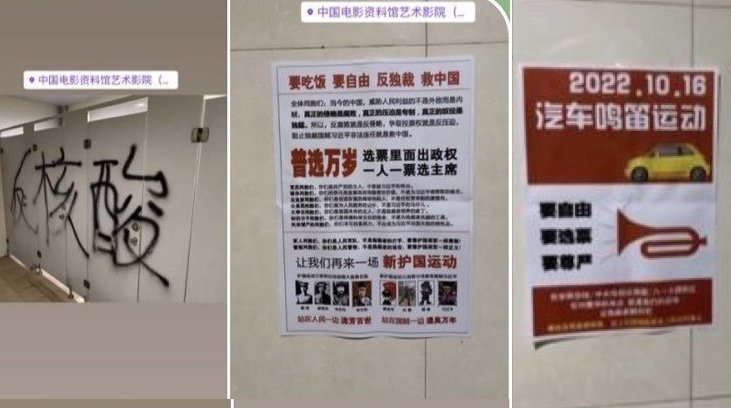
The Beijing Sitong Bridge incident occurred before the 20th National Congress of the Communist Party of China, which caused the authorities to be highly panicked. An anti-CCP anti-Xi slogan appeared in the men's toilet of the cinema of the China Film Archive.
According to the news on Twitter, when the 20th National Congress of the Communist Party of China opened in Beijing on 16 October 2022, under the strict supervision of the authorities, reproduced anti-Party and anti-Communist slogans appeared at the art theater of the China Film Archive in Beijing.
According to the uploaded photos, in a men's toilet, the words "anti-nucleic acid, anti-dictatorship" were sprayed on the wall, while the colour-printed protest posters posted on the wall shouted "if you want to eat, you must be free, anti-dictatorship and save China" and "universal suffrage". Long live! There is a political power in the ballots, one person, one vote for the chairman", and called for "another new national protection movement".
Another big-character poster called for a car whistle campaign on 16 October 2022, echoing freedom, votes, and dignity.
The information on the pictures from Twitter below stated that the incident occurred at the Art Cinema of the Beijing Film Archive.
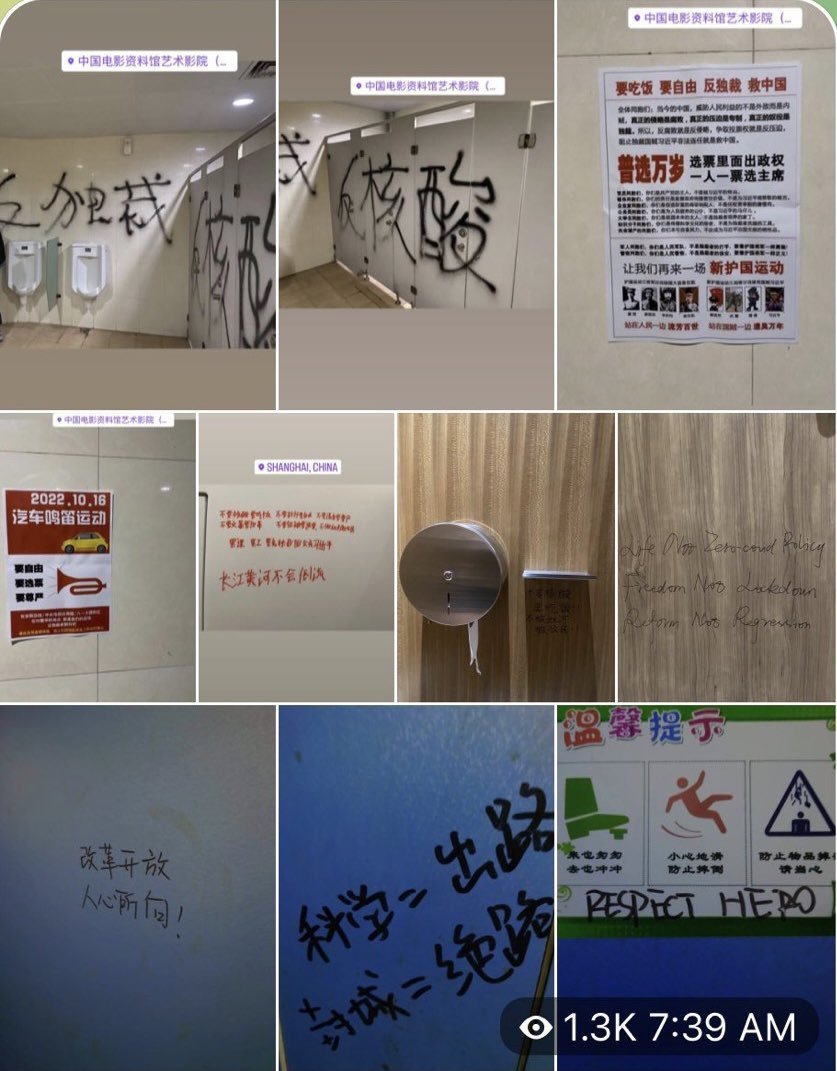
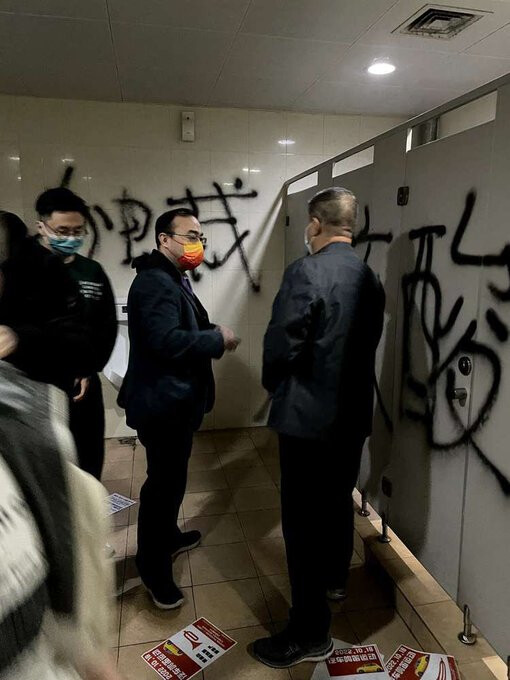
Image : The picture shows multiple men wearing masks standing in front of protest slogans. (Twitter)
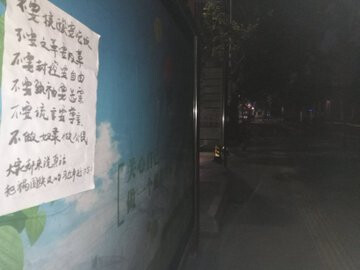
Image : Twitter
At present, the outside world cannot confirm the news that reproduced anti-dictatorship and anti-nucleic acid slogans have appeared in Beijing. The Chinese Communist Party did not respond to this.
Another wall, purported to be somewhere in Shanghai, also featured the content of a protest banner on the Sitong Bridge in Beijing.
On 13 October 2022, anti-Party and anti-CCP banners appeared on Sitong Bridge in Beijing, causing the CCP to panic. The authorities quickly recruited militiamen, volunteers, and temporary workers to guard the bridge. The city was full of "bridge watchers", causing heated discussions.
Now if anti-CCP slogans do appear in the toilets, many people have speculated whether they will recruit "toilet watchers" and "toilet monitors" again. Some people laughed and said, "Seal this place, laugh at me to death, all public toilets are suspended."
News (21)
Xi Jinping spat for more than 2 hours at the 20th National Congress of the Communist Party of China. Akio Yaita: This is a self-bragging ostrich report
Image : Xi Jinping delivered a two-hour political report at the opening ceremony of the 20th National Congress of the Communist Party of China on the 16th. (Associated Press)
The 20th National Congress of the Communist Party of China appeared on the 16th. After reading Xi Jinping's opening report, Akio Yaita, director of the Taipei branch of Japan's "Sankei Shimbun", said bluntly, "This is a self-bragging ostrich report." .
Akio Yaita posted on Facebook in the evening of the 16th that Xi Jinping’s political report at the opening ceremony of the 20th National Congress of the Communist Party of China on Sunday took more than two hours to spit, “I read the full text carefully, but did not find anything worth writing about. It can basically be judged that this is a self-proclaimed ostrich report. It has been interviewed for many years in the CCP’s conferences, large and small. It has long been known that the reports made by their leaders at the conferences are composed of “false words, big words, empty words, etc.” This tendency is particularly evident in Xi Jinping’s political report, which has almost no specific content at all.”
Akio Yaita went on to say, "I have a feeling that this report basically did not mention reform and opening up, but instead emphasized Marxism many times. This shows that in the future term of office, Xi will continue to take a left-leaning line and secretly deny Deng Xiaoping. This is definitely not good news for most of the Chinese people.”
However, in response to the Taiwan Strait issue, Akio Yaita believes that the wording of this report can be said to have become more rigid but there is still no specific discussion, "Just repeating these empty words and clichés will neither win the hearts of Taiwan's people, nor it may be supported by the international community. It does not help to solve the problem, it is purely for self-entertainment. The funny thing is... Today's Chinese government has labeled almost all Taiwanese localists as "Taiwan independence elements", No. Do you know who Xi Jinping refers to as "the vast number of Taiwan compatriots"? Maybe he really thinks that those who occasionally wave the five-star red flag on the streets of Taipei can represent "the vast number of Taiwan compatriots."
In the end, Akio Yaita mentioned that he had said before that Xi Jinping is currently carrying three time bombs, namely "over-epidemic prevention brings social unrest", "Ukrainian victory as a result of the Russian-Ukrainian war", and "the U.S. comprehensively adjusts its policy toward Taiwan", which has led to three ticking time bombs. The anti-Xi faction within the CCP has yet to act. "Once these three bombs explode, it may shake China's national capital. Unexpectedly, Xi Jinping chose the ostrich policy of "pretending not to see". "
News (22)
Angry! Hong Kong people protest in the UK against Xi Jinping's re-election at the 20th Congress, and are dragged and beaten by CCP consulate personnel
Image : A protester was pulled into the CCP consulate and beaten. (Picture taken from Twitter)
The 20th National Congress of the CCP debuted on the 16th. A Hong Kong person in the United Kingdom organized a protest to surround the CCP Consulate General in Manchester in the United Kingdom, protesting against the re-election of Chinese leader Xi Jinping and his alliance with China. There were clashes between consulate personnel, protesters were dragged into the consulate and beaten, and videos of the protests were also circulating on Twitter.
The Twitter account "@__Inty__" posted a video on Twitter PO. You can see a group of people destroying the protesters' slogans. Then the protesters and the consulate had a physical conflict. The British police were separating the two sides, and then the camera turned. A man in the consulate fell to the ground. He was being beaten by people in the consulate. The British police were trying to pull the beaten man out of the consulate.
According to comprehensive foreign media reports, a group of protesters from the "Front for the Defence of Hong Kong People" protested at the Chinese consulate in Manchester in the afternoon of the 16th. They put up pictures and slogans that satirized Xi Jinping outside the consulate to protest. Ten minutes later, there were several people in the Chinese consulate. Men wearing masks walked out and began to destroy signs and portraits, and tried to pull protesters into the consulate. One of the protesters was dragged in and then beaten.
Several violent men returned to the consulate after the police intervened. News at the scene pointed out that the white-haired man who destroyed the slogan was Zheng Xiyuan, the Chinese consul general in Manchester. The man who was pulled into the consulate and was brutally beaten called himself Bob. In an interview, he said that after being pulled in, He was beaten and kicked by many people, and there are many scars on his body. After the interview, he will examine the injuries and call the police, and call on British politicians to strongly condemn the incident.
The local police said they would investigate and strengthen patrols in the area, while the Chinese consulate said it expressed "strong indignation and firm opposition" to the protests by "a small group of 'Hong Kong independence' elements without approval" and demanded that the UK "Ensure the safety and dignity of my consular institutions and personnel".
News (23)
Ignoring foreign capital fleeing, Xi Jinping self-proclaims dynamic clearing is successful
Reporter : Lu Yongshan / https://ec.ltn.com.tw/article/paper/1546153 / Image : At the 20th National Congress of the CCP on Sunday, the leader of the CCP, Xi Jinping, issued a report reiterating that he will adhere to the dynamic clearing. (Reuters)

The 20th National Congress of the CCP debuted on Sunday. The leader of the Communist Party of China, Xi Jinping, issued a report reiterating that he will adhere to the dynamic clearing and unswerving, epidemic prevention and control, and take into account economic development, and accelerate the construction of domestic The new development pattern in which the big cycle is the main body and the domestic and international dual cycles promote each other, and strive to improve the resilience and security level of the industrial chain and supply chain. Analysts pointed out that Xi's remarks were nothing new.
In his report, Xi declared that the CCP adheres to the principle of "people first, life first." By insisting on dynamic clearing, it has protected people's lives and health to the greatest extent possible. However, China's economy has been hit hard by the zero-covid policy, with an economic growth rate of only 0.0% in the second quarter. 4%, the lowest in the same quarter of the previous year.
Sun Yeli, spokesman for the 20th National Congress of the Communist Party of China, said on the eve of the opening that growth rate is an important indicator to measure economic development, but it is not the only indicator. He said, "We are ready to accept the slowdown in economic growth in the next few years, and China will focus on solving the problem of long-term economic development." This means that China has been unable to achieve five percent economic growth target for this year.
In its annual "China Pathfinder" report co-published with the Washington-based think tank The Atlantic Council's Center for Geoeconomics, the Rhodium Group noted that the policy has brought China to a critical juncture where many foreign companies are re-opening and evaluating their operations in China to determine if they can still invest in China.
Steven Barnett, chief representative of the International Monetary Fund (IMF) in China, said a few days ago that China may not lift the zero-covid policy until the second half of next year.
Xi Jinping also reiterated his push for a dual-cycle policy, and twice emphasized the need for technological self-reliance in the report in response to the U.S. tightening export control measures against China. He also pointed out that economic development should focus on making China a major manufacturing hub, and rely on technology, talent and innovation as the main growth engine.
Ding Shuang, chief economist for Greater China and North Asia at Standard Chartered Bank, said, "Xi Jinping's speech is mainly an extension of his previous economic thinking, and there are not many new ideas."
News (24) to (26) / Reporter : Sun Yuqing / Image : CCP's adherence to the zero-covid policy and endless nucleic acid testing have generally caused people's impatience. (Reuters)
News (24)
CCP insists on dynamic clearing. Foreign media: people's patience is fading
Reporter : Sun Yuqing / https://news.ltn.com.tw/news/life/paper/1546229 / Image : CCP's adherence to the zero-covid policy and endless nucleic acid testing have generally caused people's impatience. (Reuters)
In his opening speech at the 20th National Congress of the Communist Party of China, Xi Jinping, General Secretary of the Communist Party of China, praised CCP China's "dynamic clearing" policy of epidemic prevention, and praised it as a "people first" approach. He has smashed the expectations of epidemic prevention loosening. However, the New York Times, CNN and Agence France-Presse all pointed out that with the changes in the epidemic, CCP China's epidemic prevention policies have gone from being appreciated by various countries to now being out of tune with the world, not only causing losses to economic development, but also leading to the people's fatigue.
Huang Yanzhong, a global public health expert at the American think tank "Association of Foreign Relations", told the New York Times that as the Omicron variant broke through the blockade, China's zero-covid policy was greatly reduced, and the government had to take stricter measures to isolate it from the world, and hit hard its economy.
Sonja Opper, a Chinese economic expert at Italy's Bocconi University, also told CNN that Xi Jinping's crackdown on private companies and insisting on clearing the epidemic has damaged the economy and the job market.
News (25)
Chinese feel helpless over frequent mass screenings and lockdown
Evidence is mounting that the Chinese people's patience with anti-epidemic policies is waning, and they feel helpless about frequent mass screenings, the continued increase in blocked cities, and the monitoring of all actions.
Valarie Tan, an analyst at the Mercator Center for China Studies, a German think tank, said bluntly that China's current situation is "paradoxical." Xi Jinping is about to gain power after the 20th National Congress but the country he rules is in deep trouble.
However, Scott Kennedy, senior advisor and director of China Business and Economics at the Center for Strategic and International Studies (CSIS), a Washington think tank, mentioned that Xi's talk only focused on the government's achievements in controlling confirmed cases and deaths, as a policy of zero-covid while potential changes and adjustments leave room for further improvement.
News (26)
Hundreds of thousands of students in Hohhot are blocked in schools
China's National Health Commission announced on the 16th that there were 1,026 new confirmed cases (including asymptomatic people) in the country the previous day, of which 842 were local cases. As of 9 am on 16 October, more than 2,205 places in CCP China have been designated as high-risk areas, and residents are required to stay at home. In Hohhot, Inner Mongolia, hundreds of thousands of students have also been blocked in schools. Many people sighed on social platforms that the closure and control measures do not know when they will end, and their greatest wish is to go out.
News (27)
Dynamic clearing a tool to monitor the people
According to Al Jazeera, a 34-year-old woman in Beijing was asked by the authorities to wear an electronic surveillance wristband. She could not bear with it, and criticized that the zero-covid policy has been used to monitor the people, not to fight the epidemic.
News (28)
The girl gets horrified when Biden shouldered her with love advice
Image : When U.S. President Biden attended an event in California recently, he suddenly took a shoulder to a girl and advised the other party to "don't be serious with men until the age of 30." (Twitter)
Foreign media sources pointed out that when US President Joe Biden attended an event in California recently, he suddenly took a shoulder to a girl and advised the other party to "don't be serious about men before the age of 30". The move not only made the girl dumbfounded, but also caused a burst of criticism from the outside world.
According to comprehensive foreign media reports, Biden delivered a speech at an event at Irvine Valley College (IVC) in California on the 14th. During the subsequent group photo, Biden suddenly put his hand on the shoulder of a strange girl in front of him. , and said to her, "I want to tell you a very important thing, don't be serious about men before the age of 30!"
This process was photographed by reporter Kalen D'Almeida on the PO.net, which aroused criticism from the outside world. From the picture, it can be seen that the girl who was shouldered seemed to be frightened, and she was also embarrassed about Biden's suggestion but the girl still squeezed out a smile and said "OK, I will remember this."
This process also attracted the bombardment of conservative commentator Benny Johnson, calling it "creepy", and some people questioned that Biden has made strange actions many times, questioning why Biden did this.
News (29)
The Kuomintang congratulates CCP on its 20th National Congress. Lai Ruilong: KMT betray Taiwan again!
Reporter : Chen Yufu / https://news.ltn.com.tw/news/politics/breakingnews/4091716 / Image : The 20th National Congress of the Communist Party of China was held in the Great Hall of the People in Beijing yesterday. The official Chinese media "Xinhuanet" reported that the Kuomintang sent a congratulatory message to the Communist Party. (Recover from live broadcast)
CCP's official media "XinhuaNet" released a message under the title "Relevant political parties and people in the "Taiwan region" congratulate the 20th National Congress of the Communist Party of China", revealing that the Kuomintang (KMT) sent a congratulatory message to the Chinese Communist Party. DPP legislator Lai Ruilong was interviewed and criticized KMT. He said KMT sending a congratulatory message to the CCP is another betrayal of Taiwan.
According to the "XinhuaNet" report, the Central Committee of the Kuomintang said in its congratulatory message to the Central Committee of the CCP on the 16th that on the basis of the 1992 consensus and opposition to Taiwan independence, cross-strait exchanges and cooperation have yielded fruitful results. It is hoped that the two parties will continue to communicate and cooperate sincerely. Deepen mutual trust, seek common ground while reserving differences, jointly enhance the rights and interests of people on both sides of the strait, strive to maintain peace and stability across the Taiwan Strait, and create a prosperous development of cross-strait relations.
On the same day, the Central Committee of the CCP responded to a telegram from the Central Committee of the KMT, stating that over the years, the two parties have jointly promoted the peaceful development of cross-strait relations and benefited compatriots on both sides of the strait on the basis of adhering to the 1992 consensus and opposing Taiwan independence. At present, the situation in the Taiwan Strait is becoming more and more complex and severe. They hope that the two parties will grasp the overall situation, observe the general situation, stick to the righteousness, strengthen communication, enhance mutual trust, deepen cooperation on the basis of existing common politics, and work together for peace in the Taiwan Strait, the well-being of the Chinese compatriots, national reunification, and national rejuvenation effort.
The "Xinhuanet" report also pointed out that the former chairman of the Kuomintang, Lien Chan and Hong Xiuzhu, the chairman of the new party, Wu Chengdian, and the chairman of the Non-Party Solidarity Alliance, Lin Bingkun, sent congratulatory letters, hoping that compatriots on both sides of the strait would gather wisdom, work together, and work together to promote the peaceful development of cross-strait relations and Great Rejuvenation. conspiracy for the Chinese nation.
In this regard, DPP legislator Lai Ruilong questioned that the most disappointing thing about the KMT is that it chose to stand on the opposite side of Taiwan at the most critical moment in the Republic of China. At the 20th National Congress of the Communist Party of China, Xi Jinping stated that he would not give up attacking Taiwan by force and insisted on reunifying Taiwan, completely disregarding the feelings of the Taiwanese people. In the past, he has also used military threats and diplomatic suppression. The KMT did not go to the CCP to express its opposition to reunification but sent a congratulatory message to the CCP. This is another betrayal of Taiwan, and it once again shows the world that Taiwan's largest opposition party has chosen to stand with the CCP.
Lai Ruilong pointed out that the KMT has always played the role of harmony with the CCP, which is the most unacceptable to the Taiwanese people. When the democratic camps in Europe and the United States are all supporting Taiwan, there are Kuomintang in Taiwan who are singing the 1992 Consensus with the CCP and opposing Taiwan independence. If the KMT cannot think about using Taiwan's interests to speak to China, the people of Taiwan will see the essence of the KMT more clearly, and the KMT will only become more and more frothy in Taiwan.
He Zhiwei, a legislator of the DPP, said in an interview that he respected the Chinese Kuomintang that wanted to congratulate the Chinese Communist Party. The two parties have always regarded each other as "our own people."
News (30)
Covid pandemic helps mRNA technology progress, cancer vaccine comes out within 10 years
Image : Due to the technology of the covid vaccine, scientists have also made great progress in the development of cancer vaccines, which are expected to be available within 10 years. (European News Agency)
Due to the technology behind the covid vaccine, scientists have also made great progress in the development of cancer vaccines, which are expected to be available within 10 years.
According to The Mirror, Ugur Sahin and Ozlem Tureci, founders of covid vaccine maker BioNTech, said advances in mRNA technology could help research during the covid pandemic.
The founder pointed out that they were not confident in finding a cure for cancer but now there has been a major breakthrough, so a cancer vaccine may be available before 2030, "We have learned how to make vaccines better and faster." .
Whereas traditional vaccines use a weakened form of the virus, mRNA uses the genetic code to trigger an immune response that allows people's bodies to face disease.
News (31) to (34) / Reporter : Luo Tingting / Editor: Wen Hui / https://www.ntdtv.com/gb/2022/10/18/a103553987.html
News (31)
Expert: Xi Jinping lacks a sense of security and is more "pessimistic" than in 2017
Image : On 16 October 2022, Xi Jinping stood in front of the rostrum after reading the work report at the 20th National Congress of the Communist Party of China. (Kevin Frayer/Getty Images)
Xi Jinping's work report to the 20th National Congress of the Communist Party of China mentioned "safety" 89 times, far exceeding the report of the 19th National Congress of the Communist Party of China in 2017. Experts analyze that Xi Jinping lacks a sense of security. He is more "pessimistic" than when he took full power at the 19th National Congress. This actually reflects not only Xi's personal crisis, but the crisis of the CCP regime.
News (32)
The CCP is besieged by the international community, and Xi is more "pessimistic" than in 2017
Xi Jinping delivered a nearly two-hour work report on the opening day of the 20th National Congress of the Communist Party of China on 16 October. According to Reuters statistics, the word "security" appeared 89 times in the report, far exceeding the 55 times in the report of the 19th National Congress of the Communist Party of China in 2017.
Xi Jinping said that it is necessary to "implement the overall national security concept", and also mentioned various security, including "political security", "economic security", "external security", "internal security", etc., claiming that the "new security" pattern guarantees the new development pattern”.
Referring to the international situation, Xi Jinping warned that the 1.4 billion Chinese people are "prepared to endure a major test of high winds and even stormy waves".
Since the Sino-US trade war started in 2018, the CCP has become increasingly tense in terms of foreign trade and international relations. Since the beginning of this year, the CCP’s military provocation and threats against Taiwan have led to rising tensions across the Taiwan Strait; Russia’s invasion of Ukraine has led to international sanctions, and the CCP’s close relationship with Russia has drawn strong condemnation from allies such as the United States, Europe, and NATO.
Joseph Torigian, an assistant professor at American University who studies the Communist Party's elite system, tweeted that Xi was more "pessimistic" than he was in 2017 about his understanding of the international environment.
News (33)
Civil opposition to the CCP is getting louder
The CCP is not only besieged by the international community, but in China, due to the sharp economic downturn, the clearing of the epidemic prevention policy has caused public grievances, and the voices of the people against the CCP regime are also growing louder.
Before the 20th National Congress of the Communist Party of China, on October 13, a protester displayed an anti-communist slogan and banner on the Sitong Bridge in Beijing, opposing the reset and Xi Jinping, which became a landmark event among Chinese people against the CCP's rule.
During the 20th National Congress of the Communist Party of China, Beijing was full of turmoil. The police in Tiananmen Square posted one post at three steps and one post at five steps. After the protest at Sitong Bridge, almost all bridges in Beijing were guarded, but anti-Communist slogans appeared in public toilets in Beijing. The CCP authorities are hard to guard against.
Mr. Hu, a mainland citizen, told The Epoch Times on the 16th that the 20th National Congress report repeatedly mentioned "security" because the CCP authorities felt that they were not safe. "It has always regarded the common people as its enemy, and it also regards other ideologies that are different from it as unsafe internationally, because it feels unsafe, and the international situation makes him feel unsafe, because it is taking a wrong path. ".
Mr. Hu said, "It has been worried all day long because it goes against the universal values of the world and is opposed by the people of the world. It has become a public enemy."
News (34)
Analysis: Xi Jinping emphasizes security, the CCP is in crisis
Qin Peng, a current affairs commentator based in the United States, said in NTDTV's "News and Everyone Talks" program that the CCP has always been short of what to say, and now puts safety first because it has been discovered that, in terms of the stability of the CCP's regime and the CCP's rule, "Safety" is already the number one thing.
Qin Peng said that Xi Jinping emphasized that political security is fundamental, which means that the rule of the CCP comes first. As for his mention of economic security as the foundation, it is because if the economy crosses the border, the CCP's rule will be unstable and the legitimacy of its rule will be lost. "Fundamentally speaking, why we emphasize security is actually to emphasize the security of the party and the security of Xi Jinping's personal rule."
Qin Peng believes, "More precisely, this reflects not only the personal crisis of Xi Jinping, but the crisis of the party."
In addition, Qin Peng analyzed in "Qin Peng Observation" that Xi Jinping shouted "safety", on the one hand, to scare the Chinese people and strengthen domestic rule. On the other hand, China's economy is seriously declining, which affects the legitimacy of the CCP's ruling. The World Bank predicts that China's GDP will grow by 2.8% this year, and the CCP wants to replace economic growth with "safety" as a new criterion for its legitimacy. This is a very significant change in 40 years.
Regarding Xi Jinping's repeated emphasis on "security", David Keegan, the former deputy director of the Taipei Office of the American Institute in Taiwan (AIT), told Radio Free Asia that Xi Jinping is building momentum for himself and the CCP's long-term rule by emphasizing security. If Xi is re-elected, he will control Chinese society more strictly and put more emphasis on centralized leadership.
Timothy R. Heath, a longtime senior researcher on China's national strategy at the Washington-based think tank RAND Corperation, told Radio Free Asia that the repeated emphasis on national security is a sign of the CCP's lack of security over its rule.
He believes that the CCP may focus on domestic repression for its regime’s security.
News (35) to (39) / Reporters : Zhao Fenghua and Jiang Xin / https://www.ntdtv.com/gb/2022/10/18/a103553911.html
News (35)
The 20th National Congress report mentions "security" 50 times, highlighting the CCP's anxiety
On 16 October, the 20th National Congress of the Communist Party of China appeared amid public protests. At the opening ceremony, the words "security" and "national security" appeared 50 times in a 104-minute report by General Secretary Xi Jinping.
The Epoch Times columnist Wang He believes that this highlights the CCP's concern about the instability of the regime, and that protecting the party will be the core content of the 20th National Congress.
Epoch Times columnist Wang He said, "When he talks about national security, he doesn't mean the security of the 1.4 billion people, but the security of the party. At most, it is the security of its 90 million party members, but in fact 9,000 among the 10,000 party members, many people are just a foil, and it is hundreds of families (families) and a handful of vested interests who really decide the party's policies and control the lifeline of the country's economy."
At the same time, Xi Jinping once again emphasized in the report "adhering to the general policy of dynamically clearing the Central Committee", and closed comments on this topic on the Internet. Zhang Hai, a victim of the Wuhan virus outbreak, believes this will further exacerbate popular grievances in China.
Zhang Hai, a victim of the Wuhan epidemic, said, "Repeatedly increase the level of epidemic prevention in this way, and the people will definitely resist when they can't bear it."
"How can you achieve real political security in this situation? It will only create more and more conflict."
News (36)
Xi Jinping's slip of the tongue triggers the censorship system "beating blood" and other sensitive words
During the opening speech of the 20th Party Congress, Xi Jinping still made many slips in his speech for nearly two hours. These slips of the tongue immediately triggered online censorship in mainland China and became a sensitive word that was killed in seconds.
"China's Digital Age" takes stock of these sensitive words due to Xi Jinping's slip of the tongue. For example, Xi Jinping read "one must be hard to strike iron" as "one must be hard to beat blood".
Weibo quickly set "Blood" as a search ban. The comprehensive sorting only shows one Weibo, and the real-time sorting shows no results.
There are also netizens whose accounts were quickly bombed because they posted a comparison picture of Xi Jinping's slip of the tongue.
News (37)
Sitong Bridge Incident Leads to "Butterfly Effect"
The Sitong Bridge Incident in Beijing is fermenting at home and abroad, and is triggering a butterfly effect, and a democratic storm against the CCP dictatorship is taking shape.
On 16 October, the Canadian Democratic Front rallied in front of the Chinese Consulate General in Canada to show solidarity with Peng Lifa, a warrior named "Peng Zaizhou" who was arrested by hanging a banner on the Sitong Bridge.
Sheng Xue, Global Vice President of the Canadian Democratic Front, said, "Such a desire for freedom that comes from our lives will not stop. It is precisely because there are people like Peng Lifa who can stand up. Under strict monitoring and facing the decision of life and death, he dared to stand up, which shocked many, many people in the whole world."
"Then, it is very likely that this is the butterfly in the Amazon rainforest in South America. It is really one day that it can spread to the world and bring about an earth-shattering change."
News (38)
The Sitong Bridge incident ignites self-service printing control
After the Sitong Bridge incident, some colleges and universities urgently controlled the self-service printing service for students. On 17 October 2022, screenshots circulated on the Internet showed that Beijing Tsinghua University issued a notice requiring all copy shops to stop the self-service printing business of students, and required each copy paper to be printed, must be reviewed by in-store staff.
Some netizens commented, "The dictator Ceausescu introduced the "Typewriter Law" in 1980, which stipulates that the use of typewriters must be licensed. Now it's just a typewriter turned into a printer."
News (39)
Educational institutions asked students to turn off the airdrop function of iPhones
Some netizens shared the experience of using the iPhone's airdrop (airdrop) to disseminate pictures of the Sitong Bridge incident.
Another netizen said: "I have been airdropping this." At the same time, they posted the slogan on the Sitong Bridge.
After the incident, many colleges and universities asked students to turn off the airdrop function of iPhones. A screenshot of a WeChat group notification shows that some students used Apple's airdrop function to spread so-called "inappropriate/harmful information".
News (40)
To fight or not to fight? What signal does Xi Jinping's 20th National Congress report send to Taiwan?
Reporter : Yan Shu / https://www.ntdtv.com/gb/2022/10/18/a103553781.html
When referring to the Taiwan issue in the report of the 20th National Congress of the Communist Party of China, Chinese Communist Party leader Xi Jinping said, "We will never promise to give up the use of force." So, will the CCP go to war with Taiwan, and is there a timetable? Come listen to the interpretation of the experts.
In his report to the 20th National Congress of the Communist Party of China, Xi Jinping said, "We will do our best to strive for the prospect of peaceful reunification, but we will never promise to give up the use of force and reserve the option of taking all necessary measures."
This is the first time in 20 years since the 15th National Congress of the Communist Party of China in 1997 and the 16th National Congress of the Communist Party of China in 2002, the report of the CCP Congress once again mentioned that "we will never promise to give up the use of force".
Su Ziyun, director of the Institute of National Defense Strategy and Resources of the National Defense Academy of Taiwan, believes that Xi Jinping's reiteration of not giving up force is to tell the Chinese internally; to emphasize the priority of peaceful reunification is to tell the Americans, taking into account both external and internal propaganda. demand, and the probability of a real war is not high.
Su Ziyun, director of the Institute of National Defense Strategy and Resources of the National Defense Academy of Taiwan: "So, I think the probability of a real war in the next five years is low. Only when it transfers internal pressure from the outside, it is possible to start a war."
Su Ziyun believes that in the next five years, the CCP will not be able to win Taiwan. If it attacks Taiwan, the possibility of failure is very high. Therefore, the CCP should not fight a war that is uncertain.
However, Su Ziyun also pointed out that if the CCP fails to handle domestic economic problems and social conflicts, it may still use the Taiwan issue to divert its internal focus, so Taiwan should be prepared for war.
Su Ziyun, director of the Institute of National Defense Strategy and Resources of the Taiwan National Defense Academy: "Facing Xi Jinping's term of office in the next five years, Taiwan's first priority is to strengthen its military strength. Only with sufficient military strength can it deter war."
Military Security Picture
Image of Republic of Singapore Air Force A330 flying above Changi Beach : Researcher's Picture
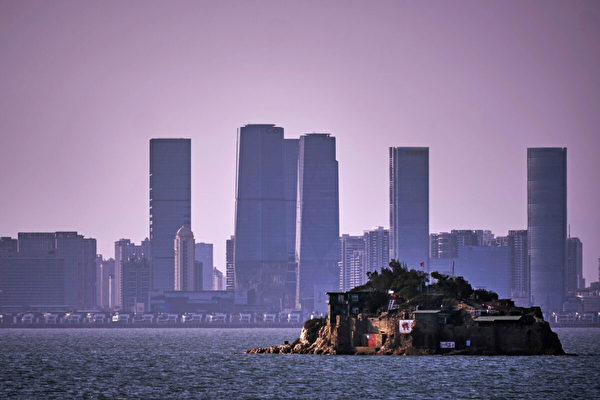




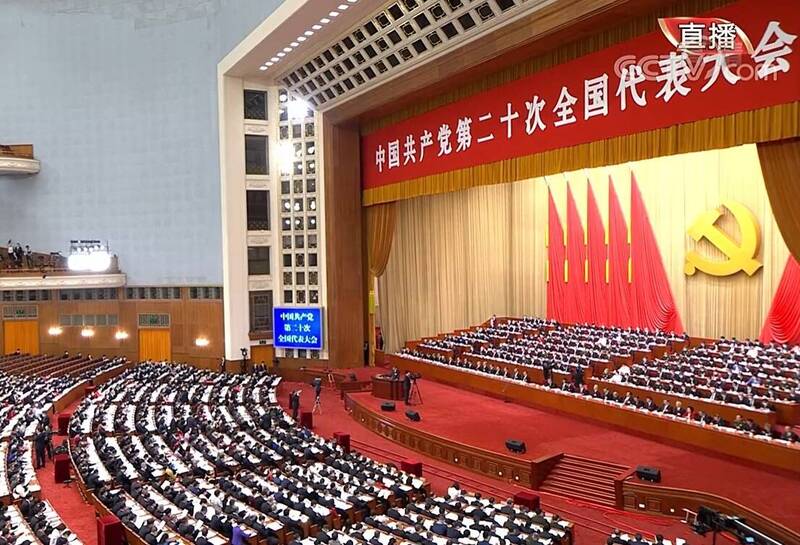






No comments:
Post a Comment